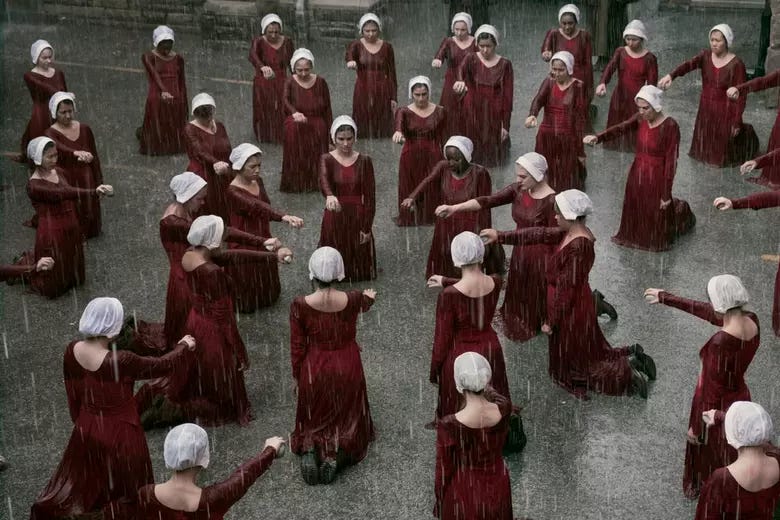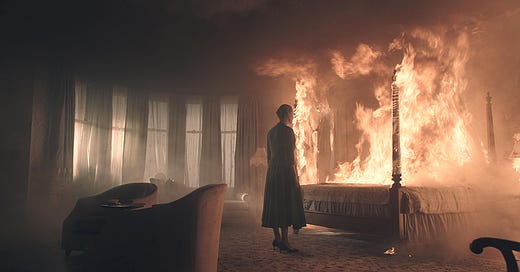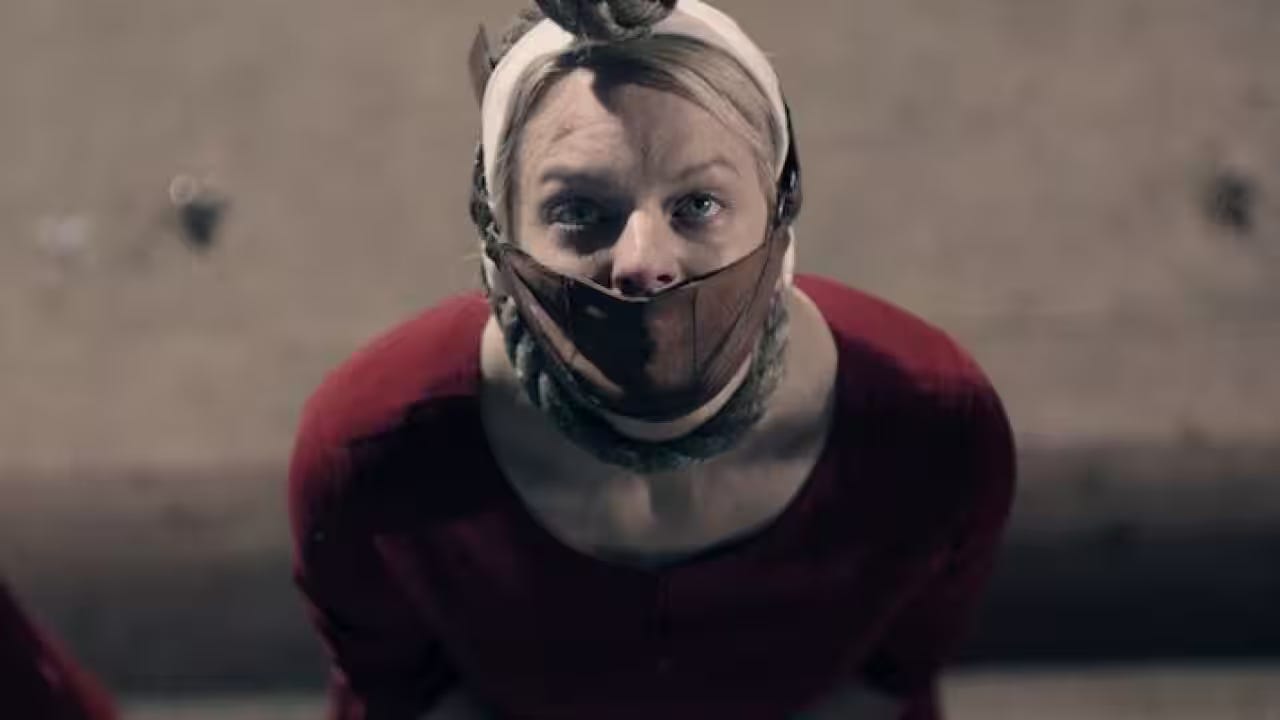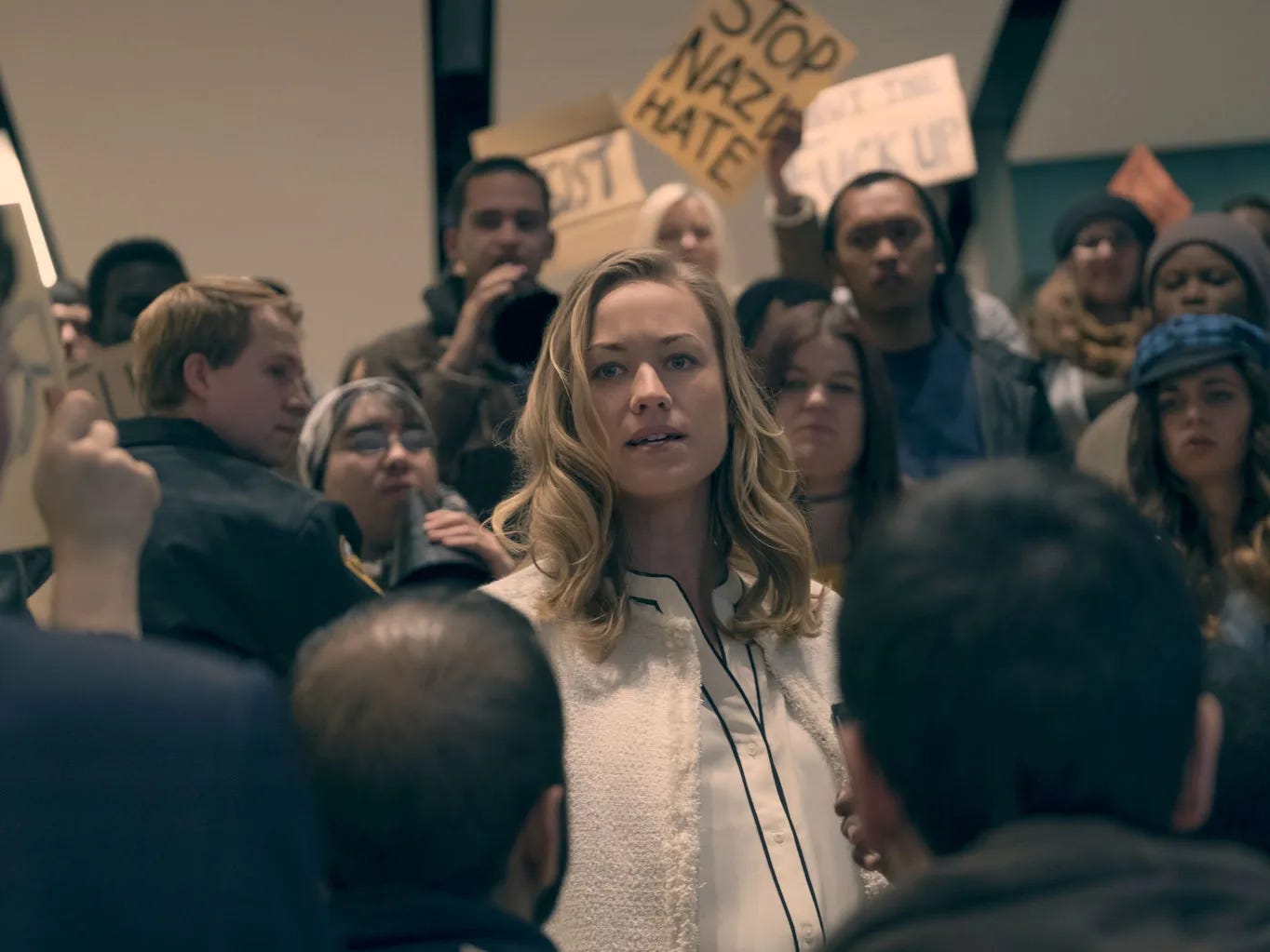The Handmaid's Tale Season 2 recap: The FAFO Season
A recap of season 2 of the Hulu Original The Handmaid's Tale
Despite my intentions to write weekly updates on The Handmaid’s Tale in the run-up to the final season, I have fallen woefully behind on that. I’ve had the opportunity to review several TV shows over at Loud & Clear Reviews, including The Righteous Gemstones, Common Side Effects, and The Studio. Between watching all of those and the heavy nature of The Handmaid’s Tale, I only recently finished watching Season 2. But given that it is probably my favorite season of the show, I wanted to share at least a few thoughts about it.
At the end of Season 1, June is leaving Gilead in the back of a truck. She is pregnant, presumably from her affair with the member of The Eye, Nick Blaine (Max Minghella). All of the handmaids are herded into Fenway Park, where a massive gallows is set up. Because they refused to stone Janine, they are being punished for their disobedience. It turns out to be a scare tactic, but it is an effective one, both for the handmaids and for us as audience members.
As the other handmaids are sent back to their postings, June is smuggled out, and through a variety of helpers, she is able to escape to an office building, where she spends the bulk of the first three episodes. These focus heavily on the time before, giving us more backstory on a few other handmaids and giving us a better view of the colonies. The season does struggle a little bit with pacing in the first episodes because so many of the characters we’ve been following are scattered. Notable moments include June creating a shrine to the people who were taken from the space she’s staying in and Moira as a refugee in Canada. It also highlights the risk that people take when helping folks who are trying to escape authoritarian rule.
June is captured at the end of episode 3 and returns to the Waterfords in episode 4, and this is where the show thrives. And in Season 2, while we get a lot of June’s story, the part that felt the most interesting to me, and ultimately why this is my favorite season, is following Serena’s story.
Throughout the second season of The Handmaid’s Tale, we get a much larger sense of what the design of Gilead, and it is largely through the backstory of the Waterfords, especially Sernea. While Margaret Atwood’s book describes the Waterfords as a kind of Jim and Tammy Faye Bakker kind of couple, the show casts them as a young, conservative Christian power couple. In one flashback, we see them speaking at college under heavy protest. They are there to promote Serena’s new book explaining how women need to stay home and have babies.
Serena is a gifted writer and her books are bestsellers. We get the impression that while both Waterfords are important people in The Brothers of Jacob, Serena is the one who has the ideas and the talent to convey those ideas in a way that makes people listen. But because so many of her ideas are propping up the patriarchy, she is increasingly shut out of the planning for Gilead. As such, her desire to see birth rates increase gets warped into a world where women have no voice, are punished for reading, and can be used as sex slaves to provide children for those with means. Serena, who has spent her adult life as a passionate voice for the movement finds her voice silenced by the movements she was propping up.
I don’t entirely feel sorry for Serena, after all, she is insistent on stealing a baby from a woman that her husband repeatedly rapes, however, she perfectly embodies the many, many women who prop up harmful systems in the hopes that they will get some scraps from it or be spared some of the worst brutalities that it has.
We have seen this play out time and again in the real world. In the most recent election, 53% of white women still voted for Trump. This is despite the fact that his first administration led to the end of Roe. Despite the fact that he is now an adjudicated rapist (though sexual assault charges have been ever present). Despite the fact that he declared an end to Diveristy, Equity, and Inclusion, something that has benefitted white women more than any other demographic. Even when there is a clear downside to white women, the majority have voted for him in every election he has run in. And Serenea Joy exemplifies that capitulation to the oppressor impressively.

On Monday we celebrated Transgender Day of Visibility. I remain disappointed knowing that one of the loudest groups opposing trans women are cis women who claim to be feminists. It is frustrating to me because women are being used to hurt other women while gaining nothing from their betrayal. Serena betrays other women in the hopes that she will get a baby of her own, but by the end of the season, she has been beaten by her husband after helping him run the country after he was gravely injured in an explosion, she loses her finger for suggesting that women and girls be allowed to read the Bible, and she ultimately sends “her” baby away with June when she acknowledges that Gilead is a dangerous place to be a woman.
As a full season of television, season 2 of The Handmaid’s Tale is a bit more uneven than the first. Visually, it is as impressive as ever. Honestly, that never dips as the cinematography and production design is top-notch through the run of the show. However, this season is slow to start and has some pacing issues throughout. And the end, when June is presented another opportunity to leave and then chooses to stay is frustrating. Yes, she wants to save her other daughter as well, but the back and forth between June leaving and staying in Gilead will be an ongoing frustration for the show in the following seasons. But thematically, I think it is one of the strongest of the bunch.
Because at the end of the day, there are simply not enough men to uphold the patriarchy by themselves. They will always need the support of women in order to carry out things that will ultimately hurt women. Women do hold up half the sky, but sadly, some choose to hold up the part that benefits their oppressors more than themselves. Serena is a prime example of both the FA and the FO, but in a way that hurts everyone.








It must be time for me to do a full rewatch of Handmaid's Tale because I can't remember most of the season 2 storyline.
Also agree on the opposition to trans women coming in big part from cis women. Not only that but a lot of queer cis women which is mind boggling to me.